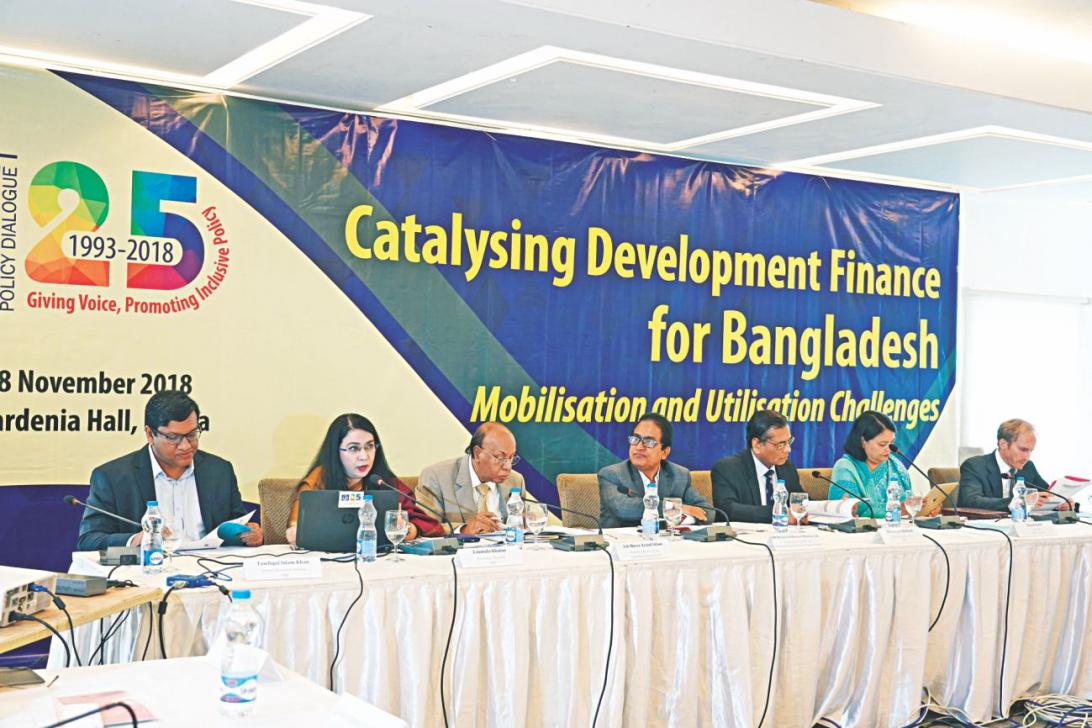68pc Bangladeshis pay no income tax: CPD survey

Some 68 percent of the population do not pay tax despite having taxable income, according to a study by the Centre for Policy Dialogue.
The independent think-tank carried out a survey earlier this year among 1,200 people with taxable income and found only 32 percent had paid income tax the previous year.
And 25 percent of the survey participants belonged to the affluent class but did not pay tax, according to the study report 'Potential of Personal Income Tax in Bangladesh: An Examination of Survey Data'.
“However, this does not mean that those who have paid tax have not evaded tax,” said Towfiqul Islam Khan, senior research fellow of the CPD, presenting the findings of the study at an event held at the Khazana Gardenia Hall in Dhaka yesterday,
The event discussed the mobilisation of development finance for Bangladesh and its utilisation challenges.
CPD Executive Director Fahmida Khatun presented the findings of another study that explored whether Bangladesh can do without foreign aid.
Khatun summarised that aid has significant positive impact at the micro level and the flow of aid in strategic areas is critical for social development. The health sector is particularly benefitted from aid.
But, aid has minimal impact on Bangladesh's economic growth.
While Khatun focused on the need for improvements in project design, implementation, management and removal of bureaucracy among donor agencies and the government, Khan said revenue mobilisation has become important for financing the Sustainable Development Goals.
Tax-GDP ratio in Bangladesh was 9 percent in fiscal 2016-17, which is far below the developing country average of 15 percent of GDP, he said.
Some 85 percent of the survey respondents believe that increased provision and quality public services will induce people to pay taxes.
The survey found that 75 percent of the respondents feel that the tax system inherently favours the elite and 65 percent believe corruption is prevalent in the taxation system.
Nearly half of the respondents find the tax system overly complex, Khan said, while calling for incentives to encourage the lower income households to become taxpayers.
“People's perception towards tax policy formulation needs to change to positive,” he said, while recommending framing of tax policies in a participatory and transparent manner.
There are nearly 35 lakh registered taxpayers and less than 20 lakh submit returns, said Md Mosharraf Hossain Bhuiyan, chairman of the National Board of Revenue. “The number of tax return submission is increasing, but we have more to do,” he added.
Bangladesh's per capita income is almost double that of Nepal's and yet the tax-GDP ratio was lower than the Himalayan nation's by 14 percentage points, said AB Mirza Azizul Islam, former finance adviser to the immediate caretaker government.
To increase the income tax collection, more attention should be paid on declaration of wealth in the tax return, said Debapriya Bhattacharya, distinguished fellow of CPD.
He, however, said Bangladesh needs foreign aid to attain its development targets. “It would not be wise to think that Bangladesh would perform better without foreign finance.”
He also questioned reasons behind higher spending of foreign aid for physical infrastructure and reduced spending on social sectors.
Efficiency of public investment, especially in infrastructure-related projects, is imperative, said Ragnar Gudmundsson, resident representative of the International Monetary Fund.
“At present, public investment in Bangladesh suffers from significant cost overrun,” he said, adding that there is a high efficiency gap in public investment management between Bangladesh and most efficient and emerging economies.
He suggested a shift towards taxation on consumption, corporate income and personal income rather higher duties on imports.
Some 1,800-1,900 firms pay more than 50 percent income tax, said Nihad Kabir, president of the Metropolitan Chamber of Commerce and Industry.
She stressed on the need for expansion of tax net and better public services so that people feel motivated to pay taxes. “If you pay taxes, you should demand services,” Kabir said.
Good utilisation of public resources induces people to be compliant, said Mustafizur Rahman, distinguished fellow of CPD.
